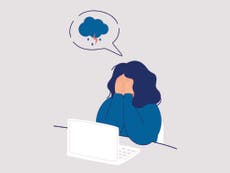Low mood caused by reduced winter sunlight can affect our ability to fight off infection, psychologist says
Lack of vitamin D affects both mental health and immunity

Your support helps us to tell the story
From reproductive rights to climate change to Big Tech, The Independent is on the ground when the story is developing. Whether it's investigating the financials of Elon Musk's pro-Trump PAC or producing our latest documentary, 'The A Word', which shines a light on the American women fighting for reproductive rights, we know how important it is to parse out the facts from the messaging.
At such a critical moment in US history, we need reporters on the ground. Your donation allows us to keep sending journalists to speak to both sides of the story.
The Independent is trusted by Americans across the entire political spectrum. And unlike many other quality news outlets, we choose not to lock Americans out of our reporting and analysis with paywalls. We believe quality journalism should be available to everyone, paid for by those who can afford it.
Your support makes all the difference.Britons who lack sunlight during the winter months are thought to live a ‘mushroom existence’, spending just an hour of each working day outside — with 2020 set to be worse than usual.
A study of 2,000 adults found that last winter, 81 per cent of people often had days where they didn’t step outside at all during daylight hours.
And just nine per cent of 18-24 year-olds have some time outside every day compared to almost 30 per cent of those over 55.
But the study, commissioned by supplement brand Healthspan, revealed this winter could be more extreme, with one in four people admitting the lack of commute and Covid-19 restrictions means they will spend even less time outside.
Others believe they will see less daylight this winter due to seeing friends and family virtually (19 per cent) and doing more online shopping than in previous years (40 per cent).
This can not only have an affect on mental health, but also physical wellbeing and immunity levels due to the lack of vitamin D.
Dr Meg Arroll, a psychologist specialising in health on behalf of Healthspan, said: “We see this pattern every winter: as the nights draw in and the weather gets colder, we spend less and less time outside in the daylight.
“This winter, with restrictions in place and more on the horizon this will have an effect on our mental health, but it could also affect our physical health and immunity levels due to the lack of vitamin D.
“Also, an experimental study conducted at Pennsylvania State University found that people who feel low or in a bad mood consistently over a given day, for several days, had higher levels of inflammation in their bodies."
This new study also shows that long-term anger and sadness can also have a direct physiological impact, Dr Arroll said, meaning it’s important to first of all notice when we’re feeling chronically down in the dumps or frustrated.
“Short bouts of irritation aren’t harmful, but months and months of dreading the winter is not only unpleasant, but there is increasing evidence to show that this mindset can impair immune function, potentially leaving us less able to fight off infection,” she added.
The study also found just over an hour is spent outside on working days, rising to a little over two hours a day at the weekend.
Those in Edinburgh spent the least amount of time outside, averaging just 47 minutes of daylight a day, compared to Londoners’ one hour and 30 minutes.
But a lack of daylight leaves 44 per cent feeling more tired than usual while 33 per cent often feel unmotivated as a result.
Others feel grumpier (32 per cent), depressed (25 per cent) and even unable to function properly (15 per cent).
It also emerged 57 per cent are dreading this winter more than usual due to the Covid restrictions, with 61 per cent worrying it will be harder on their mental and physical health.
Dr Sarah Brewer, Healthspan medical director, said: “The UK government are recommending that everyone takes vitamin D to help boost their overall health and there is increasing evidence for the immune benefits of medicinal mushrooms.
“It’s also important to look after your diet and lifestyle — get enough sleep, get physically fit and avoid excess stress.”
The study, carried out via OnePoll, also revealed that despite the lack of time outside, 74 per cent are looking forward to being able to spend cosy days and nights at home this winter.
Some are even looking to other countries for wellbeing inspiration, with 35 per cent adopting the Scandinavian trend of 'Hygge' — to surround yourself with things which provide comfort.
Dr Arroll said: “During this time when the world is still dealing with Covid-19, it’s helpful that we do everything we can to limit the harmful effects of persistent negative thought patterns such as winter dread and instead look to other countries who embrace the colder and darker months with aplomb."
SWNS


Join our commenting forum
Join thought-provoking conversations, follow other Independent readers and see their replies
Comments